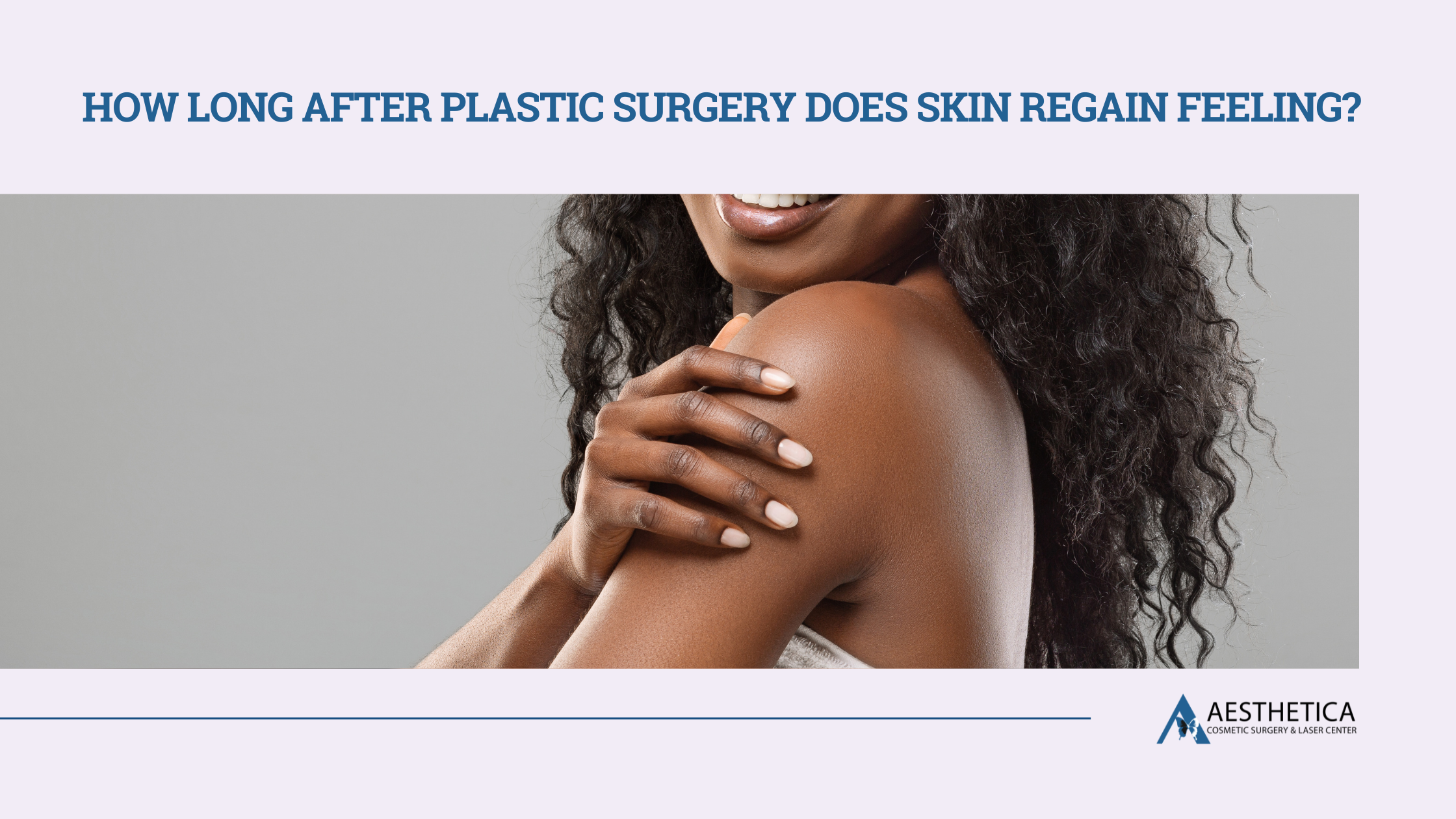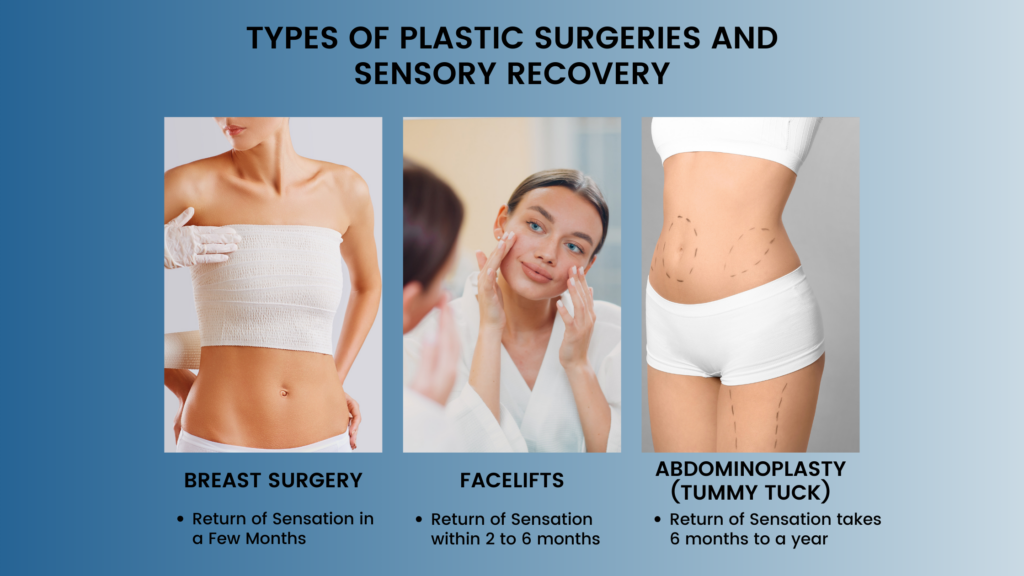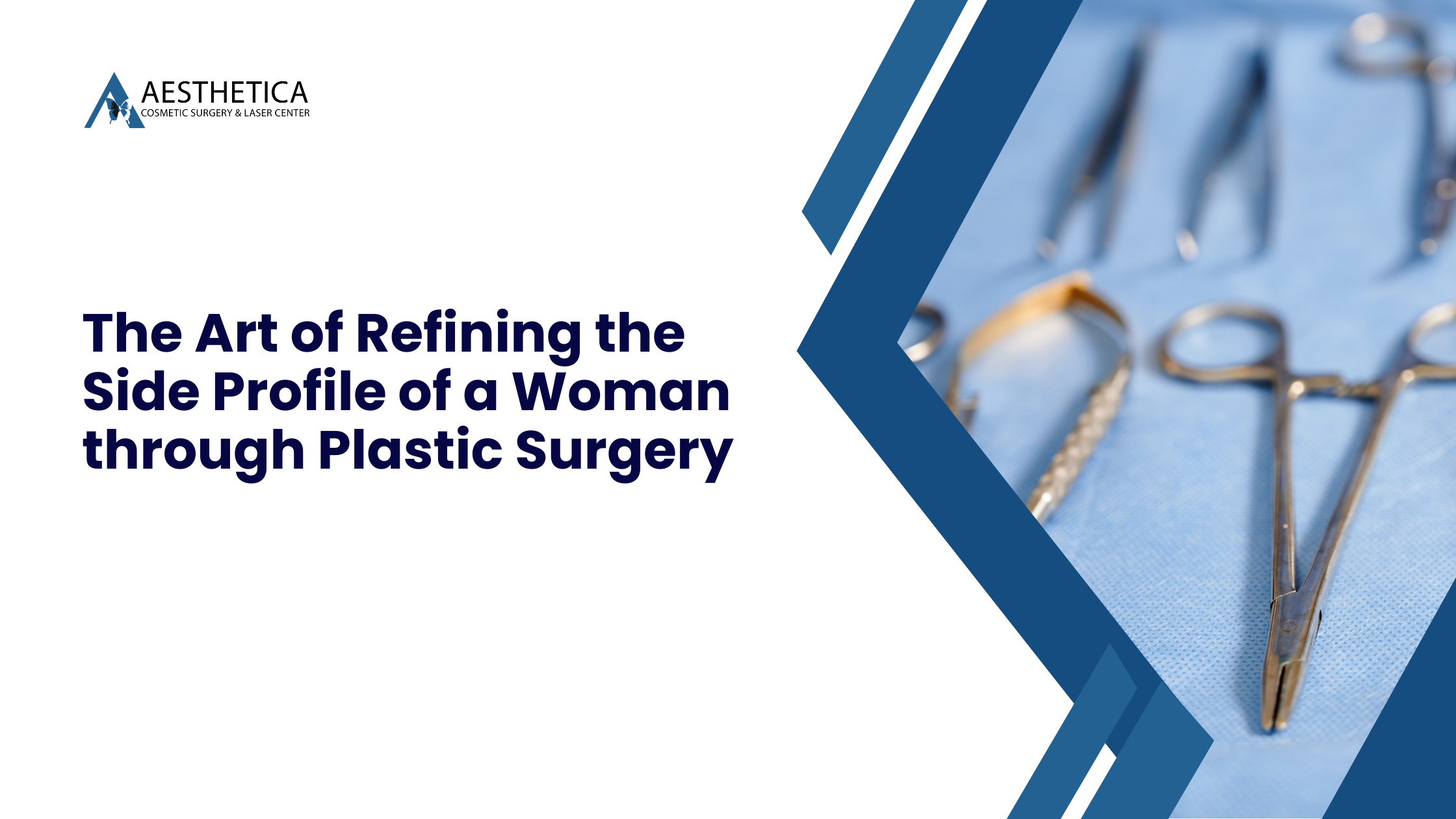How Long after Plastic Surgery Does Skin Regain Feeling?7 min read

Aesthetica Editorial Team

Understanding the timeline for sensory recovery after plastic surgery is crucial for patients who are navigating their postoperative journey.
This article delves into the intricacies of skin sensation restoration, offering comprehensive insights into what patients can anticipate during their healing process.
The Unpredictable Nature of Sensory Recovery
Post-surgical sensory changes are more like the norm than the exception.
If you’ve undergone plastic surgery, you’ll likely experience numbness or altered sensation around the surgical site.
It’s part of the body’s healing process.
But here’s the catch – there’s no one-size-fits-all timeline for when you’ll feel things return to normal. It’s as individual as your fingerprint!
3 Factors Playing a Role in Sensory Recovery
- Type of Surgery: Let’s break it down. Different surgeries impact the nerves differently. For example, in a breast augmentation, the nerves around the chest might be affected, leading to changes in sensation. On the other hand, a facelift might impact the nerves around your face and neck. The nature of the surgery dictates which nerves get the memo that things are changing.
- Extent of the Procedure: Think of it this way – the more extensive the procedure, the more your body needs to adapt post-surgery. A simple, minor procedure might lead to a quicker recovery of sensation, whereas a more complex surgery could mean a longer road to sensory normalcy.
- Individual Healing Rates: Everyone heals differently. Age, overall health, and genetics affect how quickly your sensation returns. Younger individuals tend to bounce back quicker, buit’s’s not a hard and fast rule.

The Role of Nerves in Sensation
Our skin is innervated by a vast network of nerves that transmit sensations like touch, pain, temperature, and pressure to the brain. When a surgical procedure is performed, these nerves can be affected in several ways:
- Cutting or Disruption: Small nerve endings in the skin and deeper tissues can be cut or disrupted during surgery. This is especially true in surgeries that involve significant incisions or tissue manipulation.
- Stretching or Compression: Nerves can also be stretched or compressed during surgical procedures, particularly in surgeries that involve repositioning of tissues, as seen in facelifts or tummy tucks.
- Inflammation and Swelling: Post-surgical inflammation and swelling can exert pressure on nerves, temporarily impairing their function.
Navigating the Recovery Process
Here’s the thing about sensory recovery – it can be a wild card.
One day, you might feel a tingling sensation, and the next day, it could be a bit numb. It’s all part of the journey.
The key is to keep in close contact with your surgeon and follow their advice to the letter. They’ll be your guide through this maze of recovery.
3 Types of Plastic Surgeries and Sensory Recovery
Different plastic surgeries have varied impacts on skin sensation. For instance:

Breast Surgery
In breast surgeries like augmentation or reduction, it’s common for patients to experience numbness around the incision sites.
This happens because the surgical process can disturb or even sever the nerves in the breast and nipple areas.
Typically, you might start noticing the return of sensation in a few months, but here’s the thing – it’s a gradual process.
For some, it could take up to a year or even longer for full sensation to come back.
The journey varies significantly from person to person.
Some may experience hypersensitivity as the nerves ‘wake up,’ while others might have patches of numbness that persist.
Patients who undergo breast augmentation or reduction may experience numbness around the incision sites.
Typically, feeling begins to return within a few months, but it can take up to a year for full sensation recovery.
Facelift
In breast surgeries like augmentation or reduction, it’s common for patients to experience numbness around the incision sites. This happens because the surgical process can disturb or even sever the nerves in the breast and nipple areas. Typically, you might start noticing the return of sensation in a few months, but here’s the thing – it’s a gradual process.
For some, it could take up to a year or even longer for full sensation to come back. The journey varies significantly from person to person. Some may experience hypersensitivity as the nerves ‘wake up,’ while others might have patches of numbness that persist. Patients who undergo breast augmentation or reduction may experience numbness around the incision sites. Typically, feeling begins to return within a few months, but it can take up to a year for full sensation recovery.
Abdominoplasty (Tummy Tuck)
A tummy tuck removes excess skin and fat from the abdominal area and can often include tightening abdominal muscles.
This process can disrupt the sensory nerves in the abdomen, leading to changes in skin sensation.
The path to recovery here is often longer – 6 months to a year.
Initially, the abdominal area might feel numb or have less sensation.
This is because the nerves in this area need time to regenerate and re-establish connections.
Some patients might notice gradual improvements, while others might experience sudden sensation bursts as the nerves repair.
4 Factors Influencing Sensory Recovery
Several factors influence the rate and extent of sensory recovery:
- Surgical Technique: Minimally invasive techniques tend to preserve nerve structures better, leading to quicker sensory recovery.
- Extent of Dissection: Larger areas of dissection may result in more significant sensory changes.
- Patient’s Age and Health: Younger patients and those in good health typically experience faster recovery.
- Postoperative Care: Adherence to postoperative care guidelines can aid in a smoother and quicker sensory recovery.
Managing Expectations and Postoperative Care
Educating patients about the normalcy of sensory changes and setting realistic expectations is vital.
Postoperative care, including gentle massage, adherence to medication schedules, and avoiding strenuous activities, can facilitate quicker sensory recovery.
When to Seek Medical Advice
While sensory changes are generally a normal part of the healing process, sure signs warrant immediate medical attention:
- Persistent numbness beyond the typical recovery timeline.
- Signs of infection near the incision sites.
- Sudden loss of sensation after initial recovery.
Sensory recovery after plastic surgery is a gradual process.
Patients should be prepared for variations in the timeline based on the type of surgery, their healing process, and the care they take post-surgery.
Understanding these factors helps manage expectations and contributes to a smoother recovery journey.

Ready to Embrace Your Journey with Confidence?
Meet us at 19500 Sandridge Way, Suite 350, Leesburg, VA 20176, or call us at (703) 574-4342 for a complimentary consultation with Board-Certified Plastic Surgeon Dr. Phillip Chang before proceeding with your procedure. If everything matches up, our team will help you navigate the entire process from beginning to end. Also, remember to check out our blog and social media for more information on cosmetic surgery trends!
Let Us Help You!
Our office can provide you with helpful information, schedule a free consultation, and walk you through the many services and procedures we provide.
Contact Dr. Chang's Office:
More Articles For You

The Latest Techniques in Double Chin Removal in Leesburg, VA
In the charming town of Leesburg, VA, where looking good and feeling great are top

The Art of Refining the Side Profile of a Woman through Plastic Surgery
In the realm of cosmetic enhancements, the side profile of a woman holds a pivotal

Enhance Now, Pay Later: Plastic Surgery Payment Plans in Leesburg, VA
In the picturesque town of Leesburg, VA, pursuing beauty and self-improvement is a journey many

Areola Reduction for Men in Loudoun County
In the heart of Loudoun County, where the beauty of nature meets bustling urban life,
